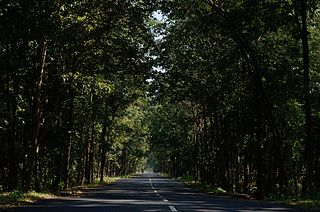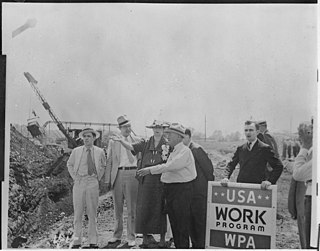Welfare reform is the process of proposing and adopting changes to a welfare system in order to improve the efficiency and administration of government assistance programs with the goal of enhancing equity and fairness for both welfare recipients and taxpayers. Reform programs have various aims: empowering individuals to help them become self-sufficient, ensuring the sustainability and solvency of various welfare programs, and/or promoting equitable distribution of resources. Welfare reform is constantly debated because of the varying opinions on a government's need to balance the imperatives of guaranteeing welfare benefits and promoting self-sufficiency.
Guaranteed minimum income (GMI), also called minimum income, is a social-welfare system that guarantees all citizens or families an income sufficient to live on, provided that certain eligibility conditions are met, typically: citizenship; a means test; and either availability to participate in the labor market, or willingness to perform community services.
The standard of living in India varies from state to state. In 2021, extreme poverty was fully eradicated to as low as 0.8% and India is no longer the nation with the largest population under poverty.

The Mid Day Meal Scheme is a school meal programme in India designed to better the nutritional standing of school-age children nationwide. The scheme has been renamed as POSHAN Scheme. The programme supplies free lunches on working days for children in government primary and upper primary schools, government aided Anganwadis, Madarsa and Maqtabs. Serving 120 million children in over 1.27 million schools and Education Guarantee Scheme centres, the Midday Meal Scheme is the largest of its kind in the world.
Mahatma Gandhi National Rural Employment Guarantee Act 2005 or MGNREGA, earlier known as the National Rural Employment Guarantee Act or NREGA, is an Indian social welfare measure that aims to guarantee the 'right to work'. This act was passed on 23 August 2005 and was implemented in February 2006 under the UPA government of Prime Minister Manmohan Singh following tabling of the bill in parliament by the Minister for Rural Development Raghuvansh Prasad Singh.
The Sampoorna Grameen Rozgar Yojana was a scheme launched by the Government of India to gain the objective of providing gainful employment for the rural poor. From 21 February 2003, EAS became an allocation-based scheme. The programme was implemented through the Panchayati Raj institutions.

Poverty is measured in different ways by different bodies, both governmental and nongovernmental. Measurements can be absolute, which references a single standard, or relative, which is dependent on context. Poverty is widely understood to be multidimensional, comprising social, natural and economic factors situated within wider socio-political processes. The capabilities approach argues that capturing the perceptions of poor people is fundamental to understanding poverty.

Social forestry is the management and protection of forests and afforestation of barren and deforested lands with the purpose of helping environmental, social and rural development. The term social forestry was first used in 1976 by The National Commission on Agriculture, when the government of India aimed to reduce pressure on forests by planting trees on all unused and fallow lands. It was intended as a democratic approach to forest conservation and usage, maximizing land utilization for multiple purposes.
The Ministry of Housing and Urban Poverty Alleviation was a ministry of the Government of India responsible for urban poverty, housing, and employment programs. It involved in national policy decisions and coordinates with Indian central ministries, state governments, and central sponsor programs.
Social security in India includes a variety of statutory insurances and social grant schemes bundled into a formerly complex and fragmented system run by the Indian government at the federal and the state level. The Directive Principles of State Policy, enshrined in Part IV of the Indian Constitution reflects that India is a welfare state. Food security to all Indians are guaranteed under the National Food Security Act, 2013 where the government provides highly subsidised food grains or a food security allowance to economically vulnerable people. The system has since been universalised with the passing of The Code on Social Security, 2020. These cover most of the Indian population with social protection in various situations in their lives.
The first Social Audit was carried out in Sweden (1985–88) by John Fry and Ulla Ressner, worklife researchers at the Centre for Swedish Working Life (Arbetslivscentrum) and published in Sweden in 1988 by Allmäna Förlaget, Stockholm under the title "Social Revision av ett Ämbetsverk". It was the result of a three-year study of Sweden's central bureaucracy - The National Labour Market Board (Arbetsförmedlingen). The study was based on interviews and questionnaires with over 1,000 employees at all levels of the organisation throughout the country and became the subject of debate in the Swedish Riksdag (Parliament). Its focus was to assess the correspondence between the work experiences of employees and management on the one hand, and the legislated and collectively agreed upon objectives for service, work environmental and managerial policies in its established definition of effectivity in the workplace. In short, it was an assessment of the institutionalisation of a Democratic Rationality. That critical research resulted in the two researchers being relieved of their permanent positions with the Swedish research institution and paid by the Swedish state to leave Sweden to immigrate to Canada in August 1990.

A job guarantee is an economic policy proposal that aims to create full employment and price stability by having the state promise to hire unemployed workers as an employer of last resort (ELR). It aims to provide a sustainable solution to inflation and unemployment.
The National Rural Employment Generation Scheme (NREGS) is an employment scheme in India for providing 100 days guaranteed wage employment for all employment seekers above 18 years of age and willing to do work. The scheme came into force on 1995 in 199 districts in India and extended to another 130 districts later.

Below Poverty Line is a benchmark used by the government of India to indicate economic disadvantage and to identify individuals and households in need of government assistance and aid. It is determined using various parameters which vary from state to state and within states. The present criteria are based on a survey conducted in 2002. Going into a survey due for a decade, India's central government is undecided on criteria to identify families below poverty line.

S. M. Raju is a civil servant working for Bihar Government.

The Public Distribution System (PDS) is an Indian food security system that was established by the Government of India under the Ministry of Consumer Affairs, Food and Public Distribution to distribute food and non-food items to India's poor at subsidised rates. Major commodities distributed include staple food grains, such as wheat, rice, sugar and essential fuels like kerosene, through a network of fair price shops established in several states across the country. Food Corporation of India, a government-owned corporation, procures and maintains the PDS.
Reetika Khera is an Indian development economist. Khera is Professor (Economics) at the Indian Institute of Technology, Delhi. She was Associate Professor at the Indian Institute of Management, Ahmedabad from 2018-20.

Pradhan Mantri Gramin Aawas Yojana, previously Indira Awas Yojana, is a social welfare programme, created by the Indian Government, to provide housing for the rural poor in India. A similar scheme for urban poor was launched in 2015 as Housing for All by 2022. Indira Awas Yojana was launched in 1985 by Rajiv Gandhi, the Prime Minister of India, as one of the major flagship programs of the Ministry of Rural Development to construct houses for the Below Poverty Line population in the villages.
Statistics on unemployment in India had traditionally been collected, compiled and disseminated once every ten years by the Ministry of Labour and Employment (MLE), primarily from sample studies conducted by the National Sample Survey Office. Other than these 5-year sample studies, India has – except since 2017 – never routinely collected monthly, quarterly or yearly nationwide employment and unemployment statistics. In 2016, the Centre for Monitoring Indian Economy, a non-governmental entity based in Mumbai, started sampling and publishing monthly unemployment in India statistics.
Pradhan Mantri Garib Kalyan Anna Yojana is a food security welfare scheme announced by the Government of India on March 26 2020, during the COVID-19 pandemic in India. The program is operated by the Department of Food and Public Distribution under the Ministry of Consumer Affairs, Food and Public Distribution. But the nodal ministry is Ministry of Finance.







